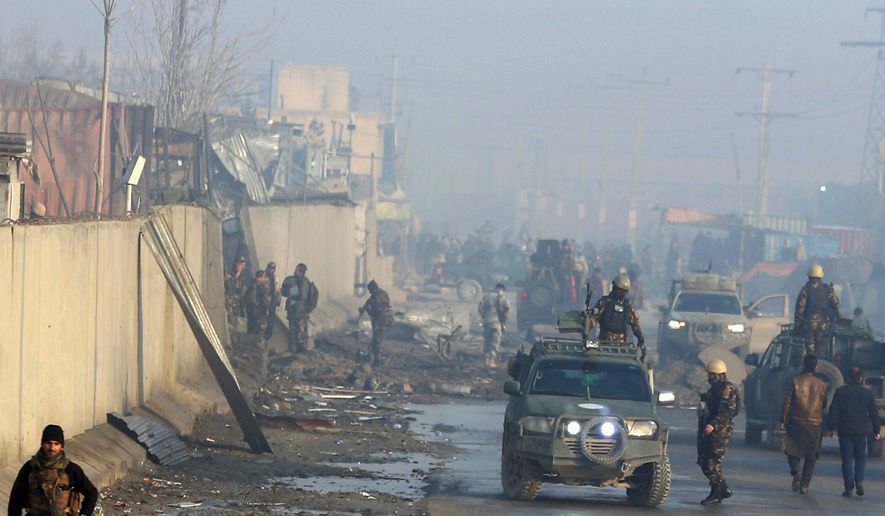A former high-level U.S. diplomat who held key ambassador posts in the Clinton, Bush and Obama eras is slamming the Trump administration’s handling of talks with the Taliban in Afghanistan, saying they’ve “delegitimized” the Afghan government and amount to a U.S. “surrender.”
Ryan Crocker, who served as U.S. ambassador to Afghanistan in the 2011 and 2012 time frame, said current negotiations being pursued with the militant group resemble the early 1970s “Paris peace talks” that resulted in the messy withdrawal of U.S. forces from Vietnam.
His assertions, made in an op-ed published Tuesday night by The Washington Post, come days after the Trump administration touted unexpected progress toward a tentative peace deal in Afghanistan, with top U.S. officials saying they are closer than ever to a comprehensive agreement with the Taliban to end the 18-year conflict.
After days of meetings in Qatar with senior Taliban leaders, U.S. envoy Zalmay Khalilzad expressed optimism early this week about the negotiations. Reports followed that a tentative “framework agreement” had been reached that could result in the withdrawal of American forces from Afghanistan in exchange for Taliban recognition of the U.S.-backed government in Kabul and a commitment from the militant group not to harbor terrorist organizations that could attack the United States or its allies.
Mr. Crocker sharply criticized the framework in his op-ed, asserting that it “was reached without the involvement of the Afghan government.”
“The Taliban has said all along that it refuses to negotiate with the government, considering the government the illegitimate puppet of the U.S. occupation,” the former ambassador wrote. “By acceding to this Taliban demand, we have ourselves delegitimized the government we claim to support.”
“This current process bears an unfortunate resemblance to the Paris peace talks during the Vietnam War. Then, as now, it was clear that by going to the table we were surrendering; we were just negotiating the terms of our surrender,” he added. “The Taliban will offer any number of commitments, knowing that when we are gone and the Taliban is back, we will have no means of enforcing any of them.”
Mr. Crocker, who also served between 1990 and 2010 as ambassador to Lebanon, Kuwait, Syria, Pakistan and Iraq, argued that “It does not have to go like this.”
“The United States could announce that talks won’t proceed beyond the framework, to matters of substance, without the full inclusion of the Afghan government,” he wrote.
The current negotiations have also drawn criticism on Capitol Hill, including from some Republican lawmakers.
Rep. Mike Waltz, Florida Republican and a member of the House Armed Services Committee, said Tuesday that he’s “skeptical at this point” about withdrawing U.S. forces in exchange for Taliban assurances that it won’t allow al Qaeda, the terror group that plotted the 9/11 attacks from Afghanistan, a new base in the country once U.S. forces leave.
“I think we eventually need to drive this type of deal, but I’m not sure that we’re there yet. The thing that I’m so concerned about is the Taliban saying, ’Trust us, we won’t let al Qaeda in, we won’t let terrorists operate from Afghanistan and strike the United States anymore,’ ” Mr. Waltz, a U.S. Army veteran who served in Afghanistan, told Fox News.
“To me, that’s like the Russians saying, ’Trust us, we won’t build nukes,’ ” he said. “What is the verification regime? How do we know that’s going to happen? We obviously can’t send inspectors over like we did with the Russians.”
Mr. Waltz added that the current verification regime centers on the existing presence of U.S. special operators in Afghanistan, including Navy Seals, and on such things as the Pentagon’s ability to fly Predator drones over the country.
“I think the verification is the Seals, our Predators, our counterterrorism efforts that have to remain in place,” he said. “Well, guess what? That’s what’s currently there. The other piece is we have to continue to build the Afghan army so that eventually they can take care of this themselves.”
“Talk of withdrawal means you’re pulling those verification pieces away,” the congressman said. “We’re not talking hundreds of thousands of troops. We’re talking 15,000. We still have 25,000 troops in Japan from World War II.”
• Lauren Meier contributed to this report.
• Guy Taylor can be reached at gtaylor@washingtontimes.com.




Please read our comment policy before commenting.